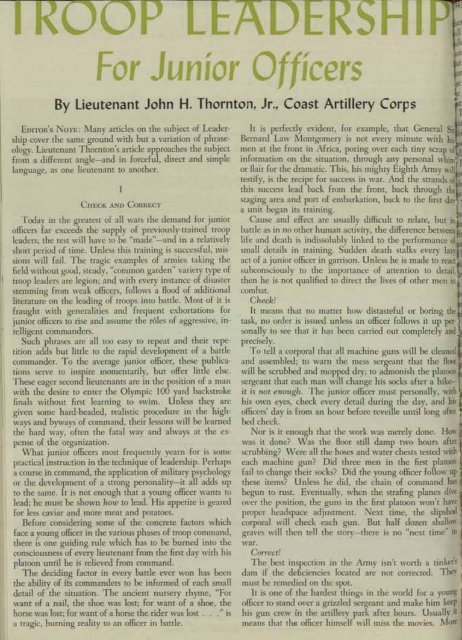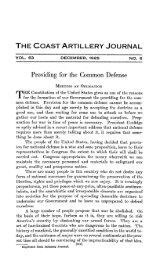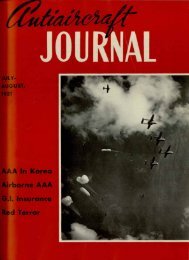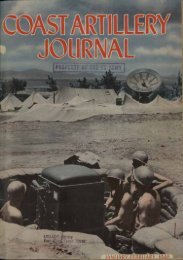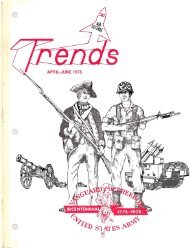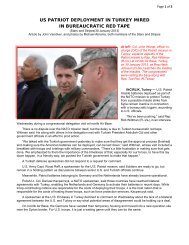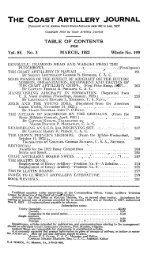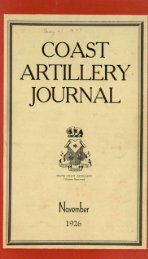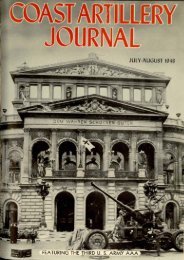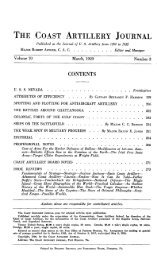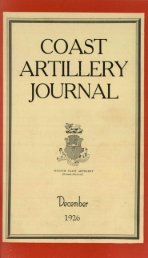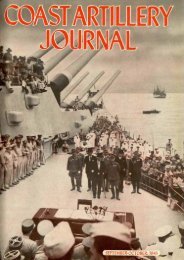July-August - Air Defense Artillery School
July-August - Air Defense Artillery School
July-August - Air Defense Artillery School
Create successful ePaper yourself
Turn your PDF publications into a flip-book with our unique Google optimized e-Paper software.
By Lieutenant John H. Thornton, Jr., Coast <strong>Artillery</strong> Corps<br />
EDITOR'SNOTE: ]\lany articles on the subject of Leadership<br />
cover the same ground with but a variation of phraseology.<br />
Lieutenant Thornton's article approaches the subject<br />
from a different angle-and in forceful, direct and simple<br />
language, as one lieutenant to another.<br />
CHECK AND COBBECT<br />
T odav in the oreatest of all wars the demand for J' unior<br />
, 0<br />
officers far exceeds the supply of previously-trained troop<br />
leaders; the rest will have to be "made" -and in a relatively<br />
short period of time. Unless this training is successful, missions<br />
will fail. The tragic examples of armies taking the<br />
field without good, steady, "common garden" variety type of<br />
troop leaders are legion; and with every instance of disaster<br />
stemming from weak officers, follows a flood of additional<br />
literature on the leading of troops into battle. ]\lost of it is<br />
fraught with generalities and frequent exhortations f~r<br />
junior officers to rise and assume the roles of aggressive, intelligent<br />
commanders.<br />
Such phrases are all toO easy to repeat and their repetition<br />
adds but little to the rapid development of a battle<br />
commander. To the average junior officer, these publications<br />
serve to inspire momentarily, but offer little else.<br />
These eager second lieutenants are in the position of a man<br />
with the desire to enter the Olympic 100 yard backstroke<br />
finals without first learning to swim. Unless they are<br />
given some hard-headed, realistic procedure in the highways<br />
and byways of command, their lessons will be learned<br />
the hard way, often the fatal way and always at the expense<br />
of the organization.<br />
What junior officers most frequently yearn for is some<br />
practical instruction in the technique of leadership. Perhaps<br />
a course in command, the application of military psychology<br />
or the development of a strong personality-it all adds up<br />
to the same. It is not enough that a young officer wants to<br />
lead; he must be shown how to lead. His appetite is geared<br />
for less caviar and more meat and potatoes.<br />
Before considering some of the concrete factors which<br />
face a young officer in the various phases of troop command,<br />
there is one guiding rule which has to be burned into the<br />
consciousness of every lieutenant from the first day with his<br />
platoon until he is relieved from command.<br />
The deciding factor in every battle ever won has been<br />
the ability of its commanders to be informed of each small<br />
detail of the situation. The ancient nursery rhyme, "For<br />
want of a nail, the shoe was lost; for want of a shoe, the<br />
horse was lost; for want of a horse the rider was lost ... " is<br />
a tragic, burning reality to an officer in battle.<br />
It is perfectly evident, for example, that General Sir<br />
Bernard Law Montgomery is not every minute with hj~<br />
men at the front in Africa, poring over each tiny scrap of<br />
infor~ation on the s~tuatio~, t~1fou.ghany. personal Whim~1<br />
or flaIr for the dramatIc. TIm, hIS mIghty EIghth Army will<br />
testify, is the recipe for success in war. And the strands of \<br />
this success lead back from the front, back through the<br />
staging area and port of embarkation, back to the first da, 1<br />
a unit began its training. ~<br />
Cause and effect are usually difficult to relate, but in~<br />
battle as in no other human activity, the difference betweentit<br />
life and death is indissolubly linked to the performance of<br />
small details in training. Sudden death stalks every laz~~<br />
act of a junior officer in garrison. Unless he is made to react~<br />
subconsciously to the importance of attention to detaiLp<br />
then he is not qualified to direct the lives of other men in I<br />
combat.<br />
Clzeck!<br />
It means that no matter how distasteful or boring the<br />
task, no order is issued unless an officer follows it up personally<br />
to see that it has been carried out completely and<br />
precisely.<br />
To tell a corporal that all machine guns will be cleaned<br />
and assembled; to warn the mess sergeant that the floor<br />
will be scrubbed and mopped dry; to admonish the platoon<br />
sergeant that each man will change his socks after a hikeit<br />
is not enollgll. The junior officer must personally, with<br />
his own eyes, check every detail during the day, and his<br />
officers' day is from an hour before reveille until long after~<br />
bed check.<br />
Nor is it enough that the work was merely done. HO\lI<br />
was it done? Was the floor still damp two hours after<br />
scrubbing? \\Tere all the hoses and water chests tested with<br />
each machine gun? Did three men in the first platoon<br />
fail to change their socks? Did the young officer follow up 1<br />
these items? Unless he did, the chain of command has ~<br />
begun to rust. Eventually, when the strafing planes diveI<br />
over the position, the guns in the first platoon won't ha\'e<br />
proper headspace adjustment. Next time, the slipshod<br />
corporal will check each gun. But half dozen shallo\l ,<br />
graves will then tell the story-there is no "next time" in ,<br />
war.<br />
Correct!<br />
The best inspection in the Army isn't worth a tinker's<br />
dam if the deficiencies located are not corrected. Th("\' I<br />
must be remedied on the spot.<br />
It is one of the hardest things in the world for a young<br />
officer to stand over a grizzled sergeant and make him keep<br />
his gun crew in the artillery park after hours. Usually it<br />
means that the officer himself will miss the movies. i\lore


